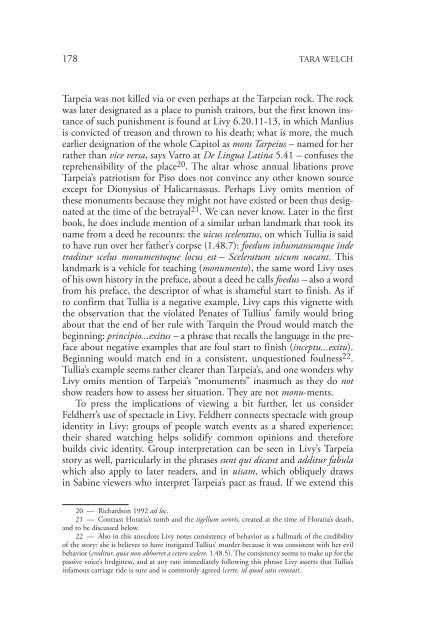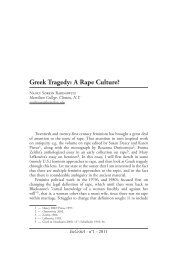Perspectives On and Of Livy's Tarpeia - EuGeStA
Perspectives On and Of Livy's Tarpeia - EuGeStA
Perspectives On and Of Livy's Tarpeia - EuGeStA
You also want an ePaper? Increase the reach of your titles
YUMPU automatically turns print PDFs into web optimized ePapers that Google loves.
178 TaRa WeLCh<br />
<strong>Tarpeia</strong> was not killed via or even perhaps at the <strong>Tarpeia</strong>n rock. The rock<br />
was later designated as a place to punish traitors, but the first known instance<br />
of such punishment is found at Livy 6.20.11-13, in which Manlius<br />
is convicted of treason <strong>and</strong> thrown to his death; what is more, the much<br />
earlier designation of the whole Capitol as mons Tarpeius – named for her<br />
rather than vice versa, says varro at De Lingua Latina 5.41 – confuses the<br />
reprehensibility of the place 20 . The altar whose annual libations prove<br />
<strong>Tarpeia</strong>’s patriotism for Piso does not convince any other known source<br />
except for dionysius of halicarnassus. Perhaps Livy omits mention of<br />
these monuments because they might not have existed or been thus designated<br />
at the time of the betrayal 21 . We can never know. Later in the first<br />
book, he does include mention of a similar urban l<strong>and</strong>mark that took its<br />
name from a deed he recounts: the uicus sceleratus, on which Tullia is said<br />
to have run over her father’s corpse (1.48.7): foedum inhumanumque inde<br />
traditur scelus monumentoque locus est – Sceleratum uicum uocant. This<br />
l<strong>and</strong>mark is a vehicle for teaching (monumento), the same word Livy uses<br />
of his own history in the preface, about a deed he calls foedus – also a word<br />
from his preface, the descriptor of what is shameful start to finish. as if<br />
to confirm that Tullia is a negative example, Livy caps this vignette with<br />
the observation that the violated Penates of Tullius’ family would bring<br />
about that the end of her rule with Tarquin the Proud would match the<br />
beginning: principio...exitus – a phrase that recalls the language in the preface<br />
about negative examples that are foul start to finish (inceptu...exitu).<br />
Beginning would match end in a consistent, unquestioned foulness 22 .<br />
Tullia’s example seems rather clearer than <strong>Tarpeia</strong>’s, <strong>and</strong> one wonders why<br />
Livy omits mention of <strong>Tarpeia</strong>’s “monuments” inasmuch as they do not<br />
show readers how to assess her situation. They are not monu-ments.<br />
To press the implications of viewing a bit further, let us consider<br />
feldherr’s use of spectacle in Livy. feldherr connects spectacle with group<br />
identity in Livy: groups of people watch events as a shared experience;<br />
their shared watching helps solidify common opinions <strong>and</strong> therefore<br />
builds civic identity. Group interpretation can be seen in Livy’s <strong>Tarpeia</strong><br />
story as well, particularly in the phrases sunt qui dicant <strong>and</strong> additur fabula<br />
which also apply to later readers, <strong>and</strong> in uisam, which obliquely draws<br />
in sabine viewers who interpret <strong>Tarpeia</strong>’s pact as fraud. If we extend this<br />
20 — Richardson 1992 ad loc.<br />
21 — Contrast horatia’s tomb <strong>and</strong> the tigellum sororis, created at the time of horatia’s death,<br />
<strong>and</strong> to be discussed below.<br />
22 — also in this anecdote Livy notes consistency of behavior as a hallmark of the credibility<br />
of the story: she is believes to have instigated Tullius’ murder because it was consistent with her evil<br />
behavior (creditur, quia non abhorret a cetero scelere, 1.48.5). The consistency seems to make up for the<br />
passive voice’s hedginess, <strong>and</strong> at any rate immediately following this phrase Livy asserts that Tullia’s<br />
infamous carriage ride is sure <strong>and</strong> is commonly agreed (certe, id quod satis constat).



